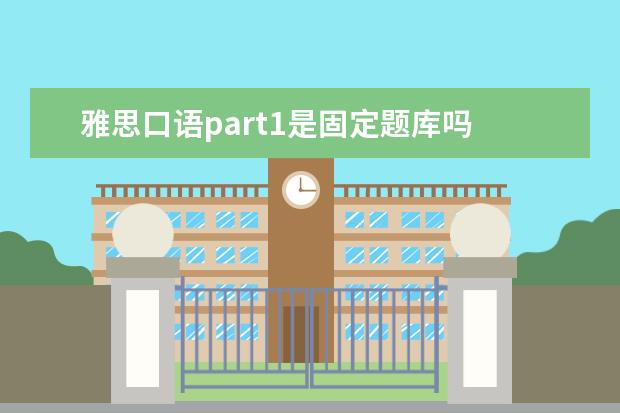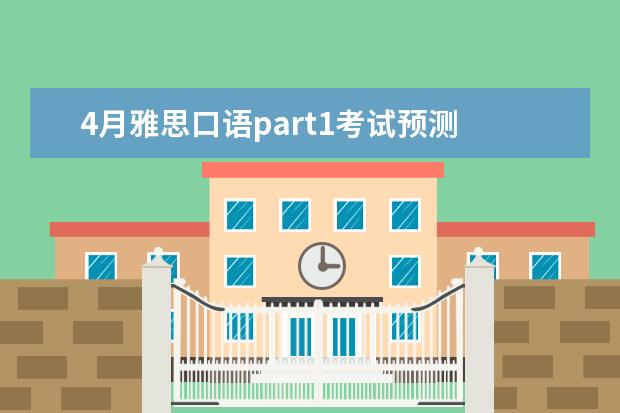今天雅思无忧小编整理了2023雅思考试备考:2023.1.5雅思口语A机经(雅思考官教你雅思口语PART1考试技巧)相关内容,希望能帮助到大家,一起来看下吧。
本文目录一览:

2023雅思考试备考:2023.1.5雅思口语A机经
您好,我是专注留学考试规划和留学咨询的小钟老师。在追寻留学梦想的路上,选择合适的学校和专业,准备相关考试,都可能让人感到迷茫和困扰。作为一名有经验的留学顾问,我在此为您提供全方位的专业咨询和指导。欢迎随时提问!
以下是小钟老师雅思考试频道编辑整理,更多详细内容请点击出国留网(
)查看。
考试日期:
2023年1月5日
Part 1考题总结
考题总结:
Studies
1. Are you working or studying?
2. Tell me about the school or university you attend.
3. Tell me something about your primary school.
4. What is your major?
5. Do you like your major and why?
6. What courses or subjects do you study?
7. What is your favorite subject?
8. What is the most useful subject?
9. What would you like to do in the future?
10. What are the characteristics of schools in China?
11. What kinds of majors are available in China?
12. What do Chinese people think about teachers?
13. Is teaching a popular job in China, why or why not?
Work
1. Are you working or studying?
2. What do you do for a living?
3. How long have you been doing this job?
4. Do you like your job, why or why not?
5. Do you find your job interesting?
6. What are your main responsibilities in your job?
7. Is working important to you?
8. Have you received any training related to your work?
9. Tell me about your boss or colleague.
10. What would be your ideal job?
11. If you could choose another job, what would you choose?
Hometown
1. Where are you from?
2. Where is your hometown?
3. Tell me about your hometown.
4. What’s your favorite thing or place in your hometown?
5. What is famous about your hometown?
6. Tell me about some scenic spots in your hometown.
7. What are the main places of interest in your hometown? What places should foreigners visit in
8. Do you like your hometown? Why or why not?
9. What is the difference between your hometown and Beijing?
10. What are the people like in your hometown?
11. If you could change one thing about your hometown, what would it be?
12. What attractive pieces of architecture are there in your hometown?
13. Is your hometown a good place for young people to live?
Home
1. Do you currently live in a house or a flat/apartment?
2. Can you describe your house/flat?
3. What main items of furniture or appliances do you have in each room?
4. Is it a typical house/flat in your city?
5. What kind of house or flat do you want to live in the future?
6. Do you like the decoration in your home? Why or why not?
7. Will you move to another house or flat in the near future?
8. What kind of house/flat are you going to move into?
9. What do you think of the area in which you live?
10. How long have you been living there?
11. What are your neighbors like?
Internet
1. Do you often use the internet?
2. How do you go onto the internet?
3. Where do you go onto the internet?
4. What do you do on the internet?
5. Is the internet very popular in China?
6. How can people learn things on the internet?
Leisure time
1. What do you do in your spare time?
2. How do you usually spend your evenings?
3. Do you prefer to staying at home in the evenings or do you prefer to going out?
Mobile phones
1. Do you use a cell phone?
2. What do you use it for?
3. How often do you use it?
4. Do you like to send short message?
5. When did you get your first mobile phone?
6. How did you feel when you got your first mobile phone?
7. What feature or function of your cell phone do you like the best?
8. Is there anything you dislike about using cell phones?
Museums
1. Are there any famous museums in your hometown/country?
2. Do you think museums are useful for visitors to your hometown/country?
3. Do you often visit a museum?
4. Did you go to any museums when you were a child?
5. When was the last time you visited a museum?
6. Do you think museums are important?
7. Do you think it’s suitable for museums to sell things to visitors?
Name
1. What’s your name?
2. Does your name have any special meaning or significance?
3. Have you ever changed your name, why or why not?
4. Do Chinese people like changing their names, why or why not?
5. What kind of people like changing their names?
6. What’s their purpose in changing their names?
7. In your culture, do women change their names when they get married?
Photography
1. Do you like photography and why?
2. When did you start to like photography?
3. Do you keep your old photos?
4. Do you often see those old photos?
5. What’s the meaning of keeping old photos?
6. What is your most impressive photo?
Schools
1. What was the first school you attended?
2. Where was it?
3. Was it far from your home?
4. How did you go to school?
5. Did you like your school?
6. What were the good things about that school?
7. Would you say it was a good school?
8. Would you send your child to that school?
9. What different types of schools have you been to?
10. Which school did you like the most, why?
11. Did your parents choose your university for you?
Relatives
1. Do you have many relatives?
2. When you were a child, which of your relatives do you see most often or spend the most time with?
3. When you were a child, did you play more with your friends or with your relatives?
4. In the future, do you think you will have more opportunities to see your relatives than you do now?
5. Who do you feel is the most important member of your family?
6. Who do you feel is the most important relative?
Shopping
1. Do you like shopping or window shopping?
2. Where do you often go shopping?
3. How often do you go shopping in a week?
4. Do you usually do your shopping at one place or at different places?
5. What kinds of shops are there near your home?
6. Do you pay more attention to price or quality?
7. What are the advantages and disadvantages of online shopping?
Sport
1. What sports do you like best?
2. Do you like doing sports, why or why not?
3. Are there any sports facilities near your home?
4. How do sports affect people’s lives?
5. What is the most popular sport in your country?
6. How often do you do sports?
7. Do you think primary school children should have sports classes at school, why or why not?
8. What are the benefits of sports for a country?
9. Is it important for a country to hold Olympic Games, why or why not?
10. What kind of sport do you enjoy watching?
Time management
1. How do you organize your time?
2. Do you think young people and older people organize their time in the same way?
3. Would you say you manage your time well?
4. Where did you learn how to organize your time?
5. How do you think you could better your time?
6. Do you think it’s useful to plan your time?
7. Have you ever been late for anything?
8. If you had more time, what would you do with the extra time?
Toys
1. What toys did you like to play when you were a child?
2. Do you think you learned anything from playing with toys?
3. Did you prefer to play with those toys alone or with other children?
4. If you had children, what toys would you give them?
Weather and Climate
1. What type of weather do you like?
2. What type of weather do Chinese people usually like?
3. Which is your favorite season?
4. Do you do different things in summer and in winter?
5. What do you often do on sunny and rainy days?
6. What is the weather like in your city?
7. Do you have some ways to control the global warming?
Wedding
1. What is a typical Chinese wedding like?
2. What people are usually involved in a wedding?
3. What clothes do groom and bride usually wear?
4. What happens during the wedding?
5. Are wedding important in China, and why?
6. How wedding ceremony has changed over there years?
Weekends
1. What do you do in your spare time?
2. How do you spend time with your family?
3. What do you usually do on weekends?
4. What did you do last weekend?
5. What do other people in your country usually do on weekends?
6. What are you going to do next weekend?
7. Do you think it is important to make the most of your weekend?
8. Do you feel that weekends now are more important to you than when you were a child?
Art
1. Are you very interested in art?
2. Did you create any art such as painting or sculpture when you were a child?
3. Have you ever been to an art gallery or an art exhibition?
4. How often do you visit art galleries?
Bags
1. What types of bags do you use in your everyday life?
2. What do you put in these bags?
3. Do you usually carry a bag when you go out?
4. What sorts of bags do women like to buy?
5. When you are buying a bag, what factors do you consider?
6. Do you think the style of a bag is very important, why or why not?
7. Do you have a bag for special occasions?
Birthdays
1. Do you like birthdays?
2. Do people in China celebrate birthdays?
3. Are any birthdays especially important in your country?
4. How do Chinese people celebrate birthdays?
5. How do you like to celebrate your birthday?
6. Do people in China have birthday parties, why or why not?
7. Do you prefer birthday parties with your friends or with your family?
8. Do you think it’s important for people to celebrate birthdays?
9. Do you think it’s important to give a special gift to someone on their birthday?
10. Are birthdays more important for children or for *s?
11. Do children and *s celebrate birthdays the same way?
12. What do children do when they have a birthday party?
Cards
1. Do you ever receive letters or cards?
2. Which do you think is better, to send a postcard or a letter?
3. Do you think it is important to send postcard to each other, why or why not?
Driving and Cars
1. Do you or your family have a car?
2. Do you know how to drive a car?
3. When did you get your driver’s license?
4. Do you think it’s important to learn how to drive?
5. Do you think it’s important to pay attention to safety when driving?
6. Do high schools in your country have driving classes, why or why not?
7. Do you think it’s important to have driving classes at school?
Clothes
1. What kind of clothes do you like?
2. How do you get information about latest fashion?
3. What are the differences in the clothes between now and fifty years ago?
4. How do older people feel about younger people’s clothes?
5. What kind of clothes do children usually wear?
6. What are the most fashionable clothes in China now?
Colors
1. What’s your favorite color, and why?
2. Do you always wear clothes in your favorite color?
3. Are there any colors that have a special meaning in your country?
4. What color would you choose to paint the walls of your room?
5. What kind of color do you dislike?
Dance
1. Do you like to dance?
2. What type of dance are you interested in?
3. What are the differences between the dances the old people like and the dances the young people like?
4. Is dancing good to people?
5. Does China have any traditional dance?
6. Is traditional dance still popular in China?
Entertainment
1. What do you do for entertainment?
2. What did you do for entertainment when you were a child?
3. What do other people do for entertainment around where you live?
4. What choices for entertainment are there for young people around where you live?
5. Are there any entertainment places near your school?
6. Have you recently been to any place for entertainment?
7. Do you think modern lifestyles give people enough time for entertainment?
Flower
1. Do you like flowers?
2. What are the most popular flowers in China?
3. On what occasions do Chinese people send flowers to others?
4. What special meanings do flowers have?
5. What is the national flower in China? And do you like it or not?
6. Do you know how to grow flowers?
Food
1. Which do you prefer to eat, lunch or dinner, and why?
2. Do you think there are any benefits from eating breakfast?
3. Are you willing to try some new food?
4. Which do you prefer, eating one big meal or eating several *all snacks?
5. What do you consider to be a healthy diet?
6. In the past few years, have there been any changes to what people in your country eat?
Friends and family
1. Do you have many close friends?
2. What qualities make them good friends?
3. Do you live with your family?
4. Do your family and friends still live in your hometown?
5. Do you think family members should live together, why or why not?
6. When do you spend time with your family?
7. What do you do together?
8. Do you often go out with your friends?
9. Is your family very important to you?
10. Do you prefer to spend time with your family or your friends?
11. What do you do in your free time with your friends?
12. Are there any times when you prefer to be alone?
Healthy lifestyle
1. What do you do to keep healthy?
2. How can people maintain good health?
3. What is a healthy lifestyle in your mind?
4. Is there any sport that you would like to try in the future?
希望以上的答复能对您的留学申请有所帮助。如果您有任何更详细的问题或需要进一步的协助,我强烈推荐您访问我们的留学官方网站
,在那里您可以找到更多专业的留学考试规划和留学资料以及*的咨询服务。祝您留学申请顺利!
雅思考官教你雅思口语PART1考试技巧
上海环球青藤为大家带来一份由雅思考官写的雅思口语part1考试技巧,各位考生可以根据雅思口语考官的建议来准备雅思口语考试。希望对大家雅思口语备考有所帮助。IELTS is set into three sections.
Part 1 is generally something about you, where you are from, do you like something, what do you think of something etc.
So you can prepare before the test to answer some of these questions. Of course you can't prepare for all things, as the examiner may throw in a few curve balls (tricky). This exchange of questions is going to be about 5 minutes.
When asked a question, for example, “Where is your hometown?” you might answer“Shanghai” This is correct but hardly a worthy answer that will convince the examiner to expect a lot from you.
Give the place and then say something about it as this shows you can engage in a conversation and not just regurgitate (give) facts and names. Maybe say something about the city, location, size, the fact you might not know much about it because you left at a young age.
“I come from China's largest city Shanghai, on the coast; do you know the area of Minhang in Shanghai? That is the part of Shanghai I was born”
A bit more than just one word.
Chances are you will get a follow up question as this is a conversation and in conversations you garner (get) information from those you are talking too.
“Can you describe… to me” or “How has the city changed” or “What do you like/don't like… about…” or “What are the people like” or "Who lives in your neighbourhood" or"Where do you buy groceries"
Answer how you feel. This isn't a test on facts, if you lie all the way through then be prepared as lying or non-truths can come back to haunt you.
“I come from the state of Nanjing in Beijing, next to India” Completely wrong but no one is taking notes on that. You will get a follow up question about it so chances are you will have todig yourself out of that hole (talk your way out of a lie). The truth is often easier to talk about.
There is a good chance you will also be asked about school or work as that is one of the main questions asked to someone you don't know.
If you are in school then maybe something about enjoying school or not enjoying school or maybe something about a topic in school, why do you study that?
If you are working then questions about what your job might be, how long have you been there, do you like it, will you stay long?
Again you don't have to tell the truth, maybe just half truths in case you feel you shouldn't give out too much information.
“I am an International spy here to assassinate you”
If you feel uncomfortable about a question then, just as in a conversation, say so and give the reason in a polite way. Politeness goes a long way. The examiner will understand as they are nice people and will try to reword the question so it isn't so invasive (direct) but they will also be able to tell if you are saying that just to bypass a question you find difficult or just don't like.
Other questions are likely to be about basic everyday things. Something about your family, neighbours, workmates, perhaps the weather or something to do with food or shopping. These are everyday things, or what you might ask someone you just met. Every question will likely have a follow up related to them. They are direct questions about the topic.
So food questions may deal with local dishes or if you like sweet food or who should do the cooking and why?
Something about your family might be the size of the family, what someone in the family does, your role in the family etc.
Be clear and precise, don't go off topic too much and don't repeat, don't repeat what you want to say. Be yourself, take a deep breath before you speak and if you spend a second thinking about it before you start talking, then nod in acknowledgement to the question. A little dead air for a second or two is fine as that is natural in conversations. A second or two, not five or 10 seconds.
Here are some other topics to think about. You can probably answer questions on them in your native tongue so now practice using English only.
Family, Language, your routine, holidays and festivals, travel, sport, Foreigners in China, Entertainment like TV and reading, cultural areas like art and architecture.
There is something called the 5Ws of Who What Where When Why and How. Basic words used to gather information. Maybe 'Have' and 'Will' should be in there too.
Pick a topic and try making questions using the Ws along with how, have and will. This isn't how questions are chosen but it is good way to practice and to help you anticipate the next question.
Like Sun Tzu says, "If you know your enemies and know yourself, you will not be imperilled in a hundred battles... if you do not know your enemies nor yourself, you will be imperilled in every single battle." The questions are the battle not the examiner.
2023年5月12日雅思考试真题回忆及解析一览
您好,我是专注留学考试规划和留学咨询的小钟老师。在追寻留学梦想的路上,选择合适的学校和专业,准备相关考试,都可能让人感到迷茫和困扰。作为一名有经验的留学顾问,我在此为您提供全方位的专业咨询和指导。欢迎随时提问!
2023年5月12日的雅思考试结束,大家觉得自己考得怎么样呢?有没有信心和雅思分手呀?还是先来对一下答案吧!下面就由小钟老师为大家介绍一下2023年5月12日雅思考试真题回忆及解析一览。
听力
一、考试概述:
本场听力考试中有3篇旧题,一篇新题,S2中又出现了地图题和匹配题,难度较大。最近的听力考试中匹配题出现频率较多,同学们需要引起重视。
Section 1 职业中介介绍,10填空
Section 2 健身房介绍,6地图 4匹配
Section 3 音乐课程讨论,6选择4匹配
Section 4 古埃及药物讲座,10填空
二、具体题目分析:
Section 1
场景:职业中介介绍
题型:10填空
Section 1 Job application enquiry
1. Telephone number (home): 0218819/Diploma: Secondary school
2. Type of job wanted: builder
3. Proficient in language: certificate in English
4. Gardening
5. No transport offered
6. Can work full-time in evenings
7. Previous jobs: painting
8. And hurt his back injuries
9. Gardening and can bring his own tools
10. Date for starting work: 15th October
Section 2
场景:健身房介绍
题型:6地图 4匹配填空
Section 2 Burnside fitness centre
11. Locker room - G
12. Woman’s fitting room - J
13. Gym room - H
14. Man’s fitting room - F
15. Squash court - B
16. Fitness machines - build up overall strength
17. Mats exercises - help body flexibility
18. Cycling class - good for lower limbs
19. Aerobic class - increase heart health beat
20. Weight training - keep concentration
Section 3
场景:音乐课程讨论
题型:6选择4匹配
SECTION 3
21 B
22 B
23 C
24 A
25 B
26 C
27 C
28 G
29 F
30 D
Section 4
场景:古埃及药物讲座
题型:10填空
Section 4 新题(顺序不定)
31. Lists
32. Sugar
33. Sculpture
34. Clean
35. Minerals
36. Resin/Metals
37. Honey
38. Symbols
39. ****
40. ****
口语
一、考试整体概述:
以下为5月份本场高频题,请考生扎实准备
1. Describe a building you like
2. Describe a public place that you think needs improvements
3. Describe a city or country that you would like to live or work
4. Describe an important river or lake in your country
5. Describe a leisure facility you would like to have in your hometown
二、本场难题及解析
Describe a building you like
You should say:
Where it is
What it is used for
What it looks like
And explain why you like it
As for a building I like, I would like to talk about a temple in my hometown.
The temple dates back to the 15th century. Today, a lot of people still go there to pray for good luck and good health. Interestingly, although it’s a holy place, it’s located on the one of busiest streets in my hometown.
But from the moment you enter the temple, you start to feel calm and peaceful. Like most historic buildings in the area, the temple faces south, and the front gate is guarded by two stone lions. As you enter the front hall, you will see four wood sculptures, which are called ‘the Four Heavenly Kings’.
The Great Hall is separated from the front hall with a courtyard where you can see lots of trees and plants. The roof of the Great Hall is supported by tall, thick columns. Inside it, you can see a Buddha statue and statues of his students.
The temple is well-preserved and in good condition. It attracts thousands of tourists each year. And it provides cultural activities as well, including traditional art classes. So besides being a place of worship, it’s also educational and fun.
阅读
一、 考试概述:
本次考试的文章是三篇新题,但有考生反应三篇题目为4月21日亚太考区原题。本次题型同样是第一篇较简单仅有填空题和判断题,但第二篇文章考了两道难度较大的配对题,第三篇文章也考了比较浪费时间的单选题及选词填空题,部分考生反应做完第二篇时间来不及。建议大家考试时以及平常练习时合理规划好做题时间。
二、具体题目分析
Passage 1:
题目:Computer games
题型:填空题6+判断题7
新旧程度:新题
文章大意:主要讲电脑游戏的历史和发展,刚开始是什么类型的游戏受欢迎,之后慢慢是什么类型受欢迎。
参考文章:
暂无
参考答案:
填空题:
1. electronics
2.Pong
3.share
4.graphics
5. PlayStation
6. females
判断题:
7. FALSE
8. TRUE
9.FALSE
10. TRUE
11. FALSE
12. NOT GIVEN
13. TRUE
Passage 2:
题目: Architecture and art
题型:段落细节配对6+人名匹配3+填空题4
新旧程度:新题
文章大意:主要讲艺术和建筑,讲建筑给艺术家提供灵感,艺术和建筑结合起来
参考文章:
暂无
参考答案:
段落细节配对:
建筑与艺术结合起来的时间E
建筑与艺术难结合的原因A
两个地标建筑A
其它暂无
人名匹配题:
20.G
21. F
22. E
填空题:
23. stone
24.VD
25. River Severn
26. Michael Rooker
Passage 3:
题目:The theory of evolution and modern business
题型:单选题5+判断题4+选项填空题5
新旧程度:新题
文章大意:达尔文进化论在商业管理中的一些应用
参考文章:
暂无
参考答案:
单选题:
27. C
28.D
29.待补充
30.B
31. A
判断题:
32. N的书里举了有说服力的例子YES
33. NO
34.thereliance of technology causes to emotional problems NOT GIVEN
35. people are more trusting than before NOT GIVEN
选项填空题:
36. 改变working environment
37. MBA graduates不相信
38.高层管理信赖Magic。。。
39. 暂无
40. 暂无
写作
TASK 1
类型:饼状图
题目:The charts show the total water use in different sectors in Sydney, Australia in 1997 and 2023.
字数:150 words
The two pie charts illustrate the percentage of total water use in five different industry sectors including service, food, building, household and manufacturing in Sydney, Australia in two separate years: 1997 and 2023.
Generally speaking, the water use in food industry constituted the largest part in both years and decreased slightly from 48% to 41%; while building industry consumed the *allest proportion, declining from 5% in 1997 to only 2% in 2023.
It should also be noticed that the proportion of water use in service industry showed a dramatic increasing trend, nearly doubled from only 13% in 1997 to 25% in 2023. By contrast, the percentage of water use in household industry and manufacturing industry both fluctuated slightly, ranging from 19% to 21% and 11% to 15% respectively.
Overall, the percentage of water consumption remained relatively stable in food, manufacturing and household industry while fluctuated obviously in building and service
TASK 2
题目类别:*,艺术
提问方式:观点类
考试题目:
People believe arts like painting and music does not directly improve the quality of life, and therefore they think government’s money should be spent on other things. To what extend do you agree or disagree?
Word count(303)
Throughout the history, arts have always been placed in an inferior place compared with other more seemingly more important facets such as education, economy and health care. As intangible arts might be, I still believe that it should be more highly valued by governments because it can make the masses enjoy a better life.
Arts, especially the visual ones, can make cities and towns more visually attractive and spectacular. This is because artists know the tips that can please our brains, and they can employ a variety of shapes, pattern, colors and designs to arouse our aesthetic desire. Moderns cities are a place to demonstrate the function of art because it is ubiquitous to see a host of well-designed advertising pictures displayed along the streets and in the shopping malls; some cities decorate landmark buildings with sophisticated external glass walls. Living in this environment, citizens are likely to be proud of the modernization of the place where they live and their sense of happiness will also be improved.
Other forms of art, such as music, opera, and dancing, can also never be underestimated due to their effect on people’s emotions. Enjoying a piece of light music or immersing themselves in an opera, people’s mind can be soothed; an engaging dance is also likely to help release some pressures because dancers focus on motions and paces, casting the worries aside for the time being. In some developed countries, music and dancing even used as aiding therapy for those who are suffering mental fatigue, considerable stress or even mental disorder.
In conclude, it is quite justifiable for governments to allocate fund to arts even though some opponents who are short sighted and norrow-mined will complain the uselessness of arts. Governments should be visionary, believing their attention and assistance in arts will never be in vain.
希望以上的答复能对您的留学申请有所帮助。如果您有任何更详细的问题或需要进一步的协助,我强烈推荐您访问我们的留学官方网站
,在那里您可以找到更多专业的留学考试规划和留学资料以及*的咨询服务。祝您留学申请顺利!
以上就是2023雅思考试备考:2023.1.5雅思口语A机经(雅思考官教你雅思口语PART1考试技巧)全部内容,更多相关信息,敬请关注雅思无忧。
雅思培训
免责声明:文章内容来自网络,如有侵权请及时联系删除。


 雅思口语part1模板技巧 雅思考官教你雅思口语PART1考试技巧
雅思口语part1模板技巧 雅思考官教你雅思口语PART1考试技巧
 英雅思口语part1题库 雅思考官教你雅思口语PART1考试技巧
英雅思口语part1题库 雅思考官教你雅思口语PART1考试技巧
 雅思口语part1题库修理东西 雅思考官教你雅思口语PART1考试技巧
雅思口语part1题库修理东西 雅思考官教你雅思口语PART1考试技巧
 雅思口语part1只从题库抽吗 雅思考官教你雅思口语PART1考试技巧
雅思口语part1只从题库抽吗 雅思考官教你雅思口语PART1考试技巧
 雅思口语part1是固定题库吗 雅思考官教你雅思口语PART1考试技巧
雅思口语part1是固定题库吗 雅思考官教你雅思口语PART1考试技巧
 雅思口语题库 part1 雅思考官教你雅思口语PART1考试技巧
雅思口语题库 part1 雅思考官教你雅思口语PART1考试技巧
 雅思口语part1考试技巧 雅思考官教你雅思口语PART1考试技巧
雅思口语part1考试技巧 雅思考官教你雅思口语PART1考试技巧
 雅思口语part1真题分析 雅思考官教你雅思口语PART1考试技巧
雅思口语part1真题分析 雅思考官教你雅思口语PART1考试技巧
 4月雅思口语part1考试预测 雅思考官教你雅思口语PART1考试技巧
4月雅思口语part1考试预测 雅思考官教你雅思口语PART1考试技巧
 雅思机经:2023.4.21 雅思口语Part1机经考题 详解雅思口语part1
雅思机经:2023.4.21 雅思口语Part1机经考题 详解雅思口语part1